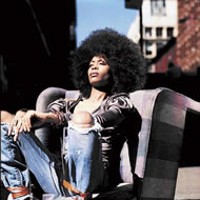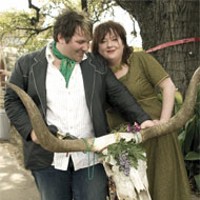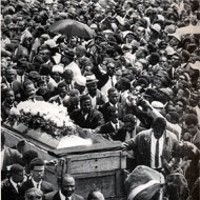Saint & Sinner Reconciled
Johnny Cash's maverick career contained disparate strains of America
By Frye GaillardPage 3 of 4
At least that was generally true. But there were, of course, exceptions, and Cash was among them. He saw no problem in focusing on problems as well as prosperity, believing that the commonality of the American experience went deeper than even the most serious of political divisions. He came at that understanding through his musical intuitions, and the process began in earnest back in 1962, when Columbia Records released an album entitled The Free-Wheelin' Bob Dylan.
It contained some of Dylan's best-known originals -- "Blowin' in the Wind," "Don't Think Twice" (which Cash later recorded), and a bitter protest anthem called "Masters of War." All of them were done in Dylan's peculiar, talking-blues style that soon turned the folk world on its ear.
Cash, however, heard the album a little bit differently from most of Dylan's other admirers.
"I didn't know him back then," he remembers, casting a glance towards Dylan's likeness, "but I liked the album so much I wrote him a letter -- got his address from Columbia Records [which is also Cash's label] and I congratulated him on a fine country record. I could hear Jimmie Rodgers in his record, and Vernon Dalhart from back in the twenties, the whole talking-blues genre. I said, "You're about the best country singer I've heard in years.'
"He wrote back and seemed kind of flabbergasted," Cash continues. "He said, "I remember one time back in Hibbing, Minnesota, in 1957, you were there and I was one of the people out there listening.' He said, "All during the 50s, it was you and Hank Williams.'"
The letters were the start of a steady correspondence that cemented a sense of soul brotherhood even before the two singers met at the Newport Folk Festival in 1963. Theirs quickly became one of the most remarkable friendships in American music, and in some ways one of the pivotal expressions of Dylan's humaneness and Cash's Christianity.
Both performers recognized that the political divisions between their fans were far from frivolous, tied as they were to such issues as war and peace and residues of prejudice. But in their music at least -- and therefore in the deeper and instinctive aspirations of the people who listen -- the two performers sensed a similar groping for the same universals. In addition to Dylan's nonpolitical songs of rambling, Cash could identify strongly with a peaceful anthem like "Blowin' In The Wind." He had recorded his share of songs like it, and some that were even more obviously angry.
One of the angriest was "The Ballad of Ira Hayes," the story of a marine in World War II who had helped plant the flag on Iwo Jima hill. The photo of Old Glory on the rise became a classic, but as the song says, Hayes was "just a Pima Indian." He returned to the reservation, where jobs were scarce, and without either work or hope, he became a drunk. One night as he staggered home he passed out and drowned in an irrigation ditch with barely two inches of water in the bottom.
Cash recorded a whole album of songs about such Indian tragedies, but he also wrote and sang about other subjects that struck far closer to home for most of his audience. During the height of the protests against the war in Vietnam, he wrote a song called "What Is Truth?," offering a blunt chastisement of those who were closing their minds to the young.
The odd thing was that the song was a hit on the country charts, and the reason, Cash thinks, is that even in his most protesty songs, he never traveled far down the road to ideology -- never let his music depart from its basically Christian, humane roots to become the political property of any one faction.
But the factions didn't understand all of that, and they worked very hard to claim Cash as their own. Richard Nixon invited him to appear at the White House and, through H. R. (Bob) Haldeman, asked him to sing two of the most conservative songs of the era -- Merle Haggard's "Okie from Muskogee," and a reactionary recitation called "Welfare Cadillac," written on a whim by an amateur songwriter named Guy Drake.
Cash politely refused to sing either song, much to the delight of his growing following of college kids. But much to their simultaneous disappointment, he pointedly refrained from criticizing either Nixon or the songs themselves, explaining instead that he didn't know "Welfare Cadillac," and that he was sure Nixon would soon invite Haggard himself to sing "Okie from Muskogee."
Speaking of Vibes_feature.html
-

The New Mythology of AFRO-FUTURISM
Jul 20, 2005 -

Nothing Fails Like Success
Jul 13, 2005 -

Scarlet Begonias
Jul 6, 2005 - More »
Latest in Music Features
More by Frye Gaillard
-

Efficiently Careless
Nov 2, 2005 -

Where The Action Was
Jun 1, 2005 -

Curtis Turner, A Great Driver
Mar 23, 2005 - More »
Calendar
-
Hozier - Unreal Unearth Tour 2024 @ PNC Music Pavilion
-
Beach Fossils with friends Nation of Language @ The Underground
-
The Rock Orchestra By Candlelight @ N.C. Music Factory
-

Haw River Wine Tasting @ Carolina Beer Temple.
-
ATTILA, BORN OF OSIRIS w/ TRAITORS, EXTORTIONIST, NOT ENOUGH SPACE @ The Underground
-
Justin Fedor's tribute shows benefit Levine Children's Hospital
Charlotte musician's concert series takes place at the Neighborhood Theatre
-
Hayley Williams topless photo circulates
Topless photo of Paramore's Hayley Williams hits the Internet.
-
Live review, photos: Chickenfoot 4














